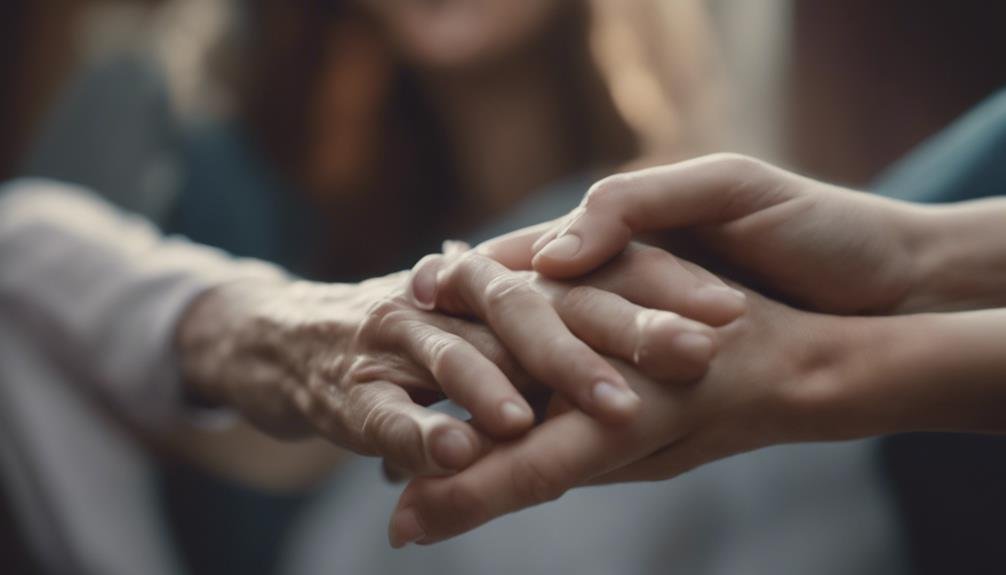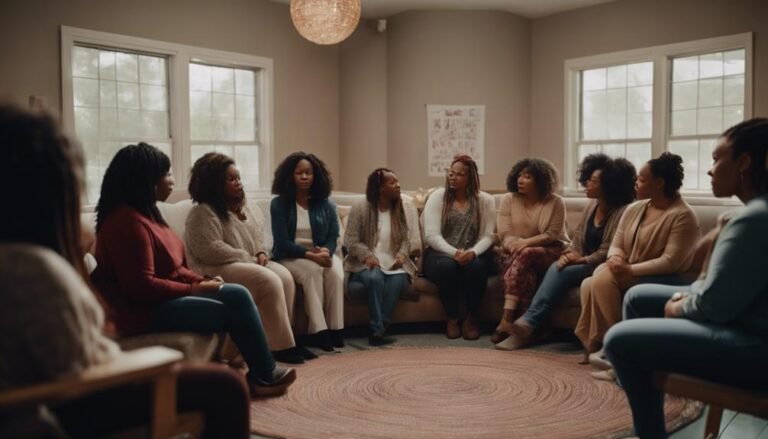Recognizing signs of domestic violence in loved ones is crucial. Look for unexplained injuries, frequent hospital visits, or sudden changes in appearance. Watch out for emotional red flags like anxiety, low self-esteem, or signs of control. Notice any abrupt behavioral changes, fear, or withdrawal. Keep an eye on signs of isolation, financial manipulation, or hidden decisions. Trust your instincts and approach your loved ones with compassion. Encourage open communication, offer support, and provide resources like the National Domestic Violence Hotline. Being aware of these signs can help you support them better.
Key Takeaways
- Look for unexplained injuries or changes in appearance.
- Be aware of emotional symptoms like anxiety and low self-esteem.
- Watch for sudden behavioral changes and signs of fear.
- Notice psychological clues like isolation and low self-esteem.
- Pay attention to financial warning signs like restricted access to funds.
Physical Indicators
To identify signs of domestic violence, pay close attention to physical indicators like unexplained injuries, bruises, or frequent hospital visits in your loved one. These physical signs of abuse can manifest in various ways, such as unexplained bruises or injuries that seem inconsistent with their explanations. Keep an eye out for any changes in appearance, like wearing long sleeves even in warm weather to hide potential injuries. Additionally, be mindful of any signs of physical pain or discomfort that your loved one may try to conceal.
If you notice these physical indicators of potential abuse, it’s vital to trust your instincts and offer support. Your loved one may be hesitant to speak up about their situation, so providing a safe and non-judgmental space for them to share their concerns is essential.
Encourage seeking help from professionals or organizations that specialize in assisting individuals facing domestic violence. Remember, your support and intervention can make a significant difference in their well-being.
Emotional Symptoms
Pay close attention to emotional distress signals like anxiety, depression, or sudden mood swings in your loved ones as potential indicators of domestic violence. Emotional signs of domestic abuse can manifest in various ways, such as low self-esteem, feelings of helplessness, or self-blame.
If you notice your loved one exhibiting these behaviors, it could be a red flag for emotional abuse in their relationship. Additionally, be vigilant for signs of control or manipulation, like constant criticism, isolation from friends and family, or excessive dependence on the abuser.
It is essential to offer your support and create a safe space for open communication if you suspect someone you care about is experiencing emotional abuse. Encouraging them to seek help and reassuring them that they aren’t alone can make a significant difference.
Behavioral Changes
Be attentive to any sudden and unexplained behavioral changes in your loved ones, as these could be signs of domestic violence. If you notice your loved one becoming more withdrawn, isolated, or showing signs of fear and anxiety, especially around their partner, it could indicate a concerning situation. Watch out for increased agitation, mood swings, or a loss of interest in activities they once enjoyed.
Controlling behavior from their partner, like restricting access to money or monitoring their every move, is also a red flag. Your intuition is important in recognizing these signs, so trust your instincts.
Psychological Clues
Observe for indications of psychological abuse by noting any signs of low self-esteem, self-blame, or helplessness in your loved ones. If you notice your loved one displaying fear, anxiety, or depression without a clear cause, it could be a psychological response to domestic violence.
Abrupt personality changes or extreme mood swings may also be behavioral indicators of psychological abuse. Look out for signs of isolation from friends and family, or a sudden withdrawal from social activities, as these could indicate psychological distress.
Financial signs like limited access to resources or money may also serve as psychological indicators of domestic violence in your loved ones. It’s vital to pay attention to these cues and offer your support and understanding.
Remember that psychological abuse can have long-lasting effects, so reaching out to your loved one and providing a safe space for them to open up is essential in helping them break free from this cycle.
Financial Warning Signs

You may notice sudden changes in how money is controlled in your relationship, like restricted access to funds or accounts, which can be a sign of financial abuse.
Keep an eye out for unexplained or excessive spending on items that don’t benefit you, as this could indicate financial manipulation.
If you feel like your spending is constantly monitored, or if you’re pressured to share financial information, these could be red flags for financial abuse that you should be aware of.
Money Control Dynamics
Understanding the financial warning signs of domestic violence is essential in recognizing control dynamics within abusive relationships. Money control dynamics, such as limited access to funds, being denied financial resources, or having restricted access to bank accounts, are common red flags of financial abuse.
Abusers may exert power by withholding income, preventing their partner from working or attending school, or demanding an account for every penny spent. This manipulation can lead to economic dependence, making it challenging for the victim to break free from the abusive cycle.
Hidden Financial Decisions
Keep an eye out for any sudden or unexplained changes in financial decisions, as these could be hidden warning signs of domestic violence. Financial abuse often manifests through controlling finances, secretive behavior around money, or coercive tactics to gain financial advantage.
If you notice discrepancies in spending patterns, sudden debts without a clear explanation, or limited access to money and resources, it might indicate financial manipulation by an abuser. Victims of domestic violence may be prevented from working or have their access to financial resources tightly controlled by their partner.
Additionally, coercive tactics like pressuring the victim into taking on debts or signing financial documents against their will can be forms of financial abuse. Being attentive to these hidden financial decisions can help identify potential signs of domestic violence and provide support to those in need.
Isolation Patterns
In cases of domestic violence, isolation patterns manifest in the abuser’s control over the victim’s social interactions and connections. This control can take various forms, such as limiting communication with friends and family, monitoring activities, or creating fear to keep the victim isolated. By isolating the victim, the abuser increases their dependence and power over them, making it harder for the victim to seek help or escape the abusive situation.
Recognizing signs of isolation in your loved ones is important. Watch out for sudden changes in behavior, withdrawal from social activities, or unexplained absences from gatherings. If you notice these signs, it’s crucial to approach the situation with care and empathy.
Encouraging open communication and offering support can help your loved one feel safe to share their experiences and seek assistance.
Self-blame and Low Self-esteem

Acknowledging the impact of domestic violence on self-blame and low self-esteem is essential in understanding the emotional toll it takes on victims. In cases of domestic abuse, individuals often internalize the blame for their partner’s abusive behavior, leading to self-blame and a deep sense of unworthiness. Constant criticism, manipulation, and control in an abusive relationship can chip away at one’s self-esteem, fostering feelings of inadequacy and self-doubt. Victims may start believing they deserve the mistreatment, further perpetuating the cycle of abuse.
Recognizing signs of self-blame and low self-esteem in your loved ones is important in offering support and intervention. If you notice a friend or family member exhibiting diminished self-worth, making self-deprecating remarks, or expressing feelings of guilt for their partner’s actions, it could be indicative of underlying domestic violence.
Limited Access to Resources
Victims of domestic violence often face significant challenges due to their limited access to essential resources. Abusers controlling money can leave victims financially dependent and unable to make independent decisions.
Limited access to transportation and communication tools further isolates victims, making it difficult to seek help or escape dangerous situations. Additionally, restricted access to important documents such as identification papers or passports hinders victims from leaving the abusive relationship or seeking legal assistance.
The emotional trauma inflicted by the abuser, coupled with isolation from support networks, exacerbates the feeling of helplessness. Victims may also have limited access to healthcare services, impacting their ability to address physical injuries and seek mental health support. Counseling for recovery becomes a distant possibility when access to such essential services is constrained.
Understanding these limitations can help in offering the necessary support and resources to empower victims of domestic violence.
Approaching Loved Ones

When noticing concerning signs of domestic violence in a loved one, approaching them with compassion and understanding is crucial to initiate a supportive conversation. Look for physical injuries, changes in behavior, isolation from friends and family, and signs of fear as potential indicators of abuse.
Encourage open communication by creating a safe space for them to share their feelings without judgment. Educating yourself on the signs of domestic violence is vital to better recognize and address any concerning behavior in your loved ones.
Remember to offer support without pressuring your loved one to disclose information if they aren’t ready. By approaching loved ones with empathy and patience, you can help them feel heard and supported.
Providing resources such as the National Domestic Violence Hotline and local support services to assist your loved ones in seeking help and guidance can make a significant difference in their journey towards healing and safety.
Frequently Asked Questions
Which Are the Three Main Warning Signs That Someone May Be an Abuser?
When someone may be an abuser, watch out for physical aggression, controlling behavior, and isolation tactics. These warning signs, along with manipulative tendencies, jealousy issues, lack of empathy, and power imbalances, can indicate potential harm.
What Are Warning Signs That Indicate You May Be a Victim?
If you suspect you’re a victim of domestic violence, watch for signs like unexplained injuries, fear, isolation, financial control, gaslighting, intimidation, and power dynamics. Seek help from trusted sources. You deserve safety and support.
Which of the Following Is an Indicator of an Abuser?
You can recognize an abuser by their controlling behavior, manipulative tactics, isolation techniques, intimidation tactics, physical violence, emotional abuse, and financial control. These signs indicate a potential abuser who may harm you or a loved one.
Conclusion
In recognizing signs of domestic violence in loved ones, it’s important to trust your instincts and offer support without judgment.
Just like a flower struggling to grow in the darkness, your loved ones may be hiding their pain. By being observant and compassionate, you can help them break free from the cycle of abuse and find the light they deserve.
Remember, you aren’t alone in this journey towards healing.






